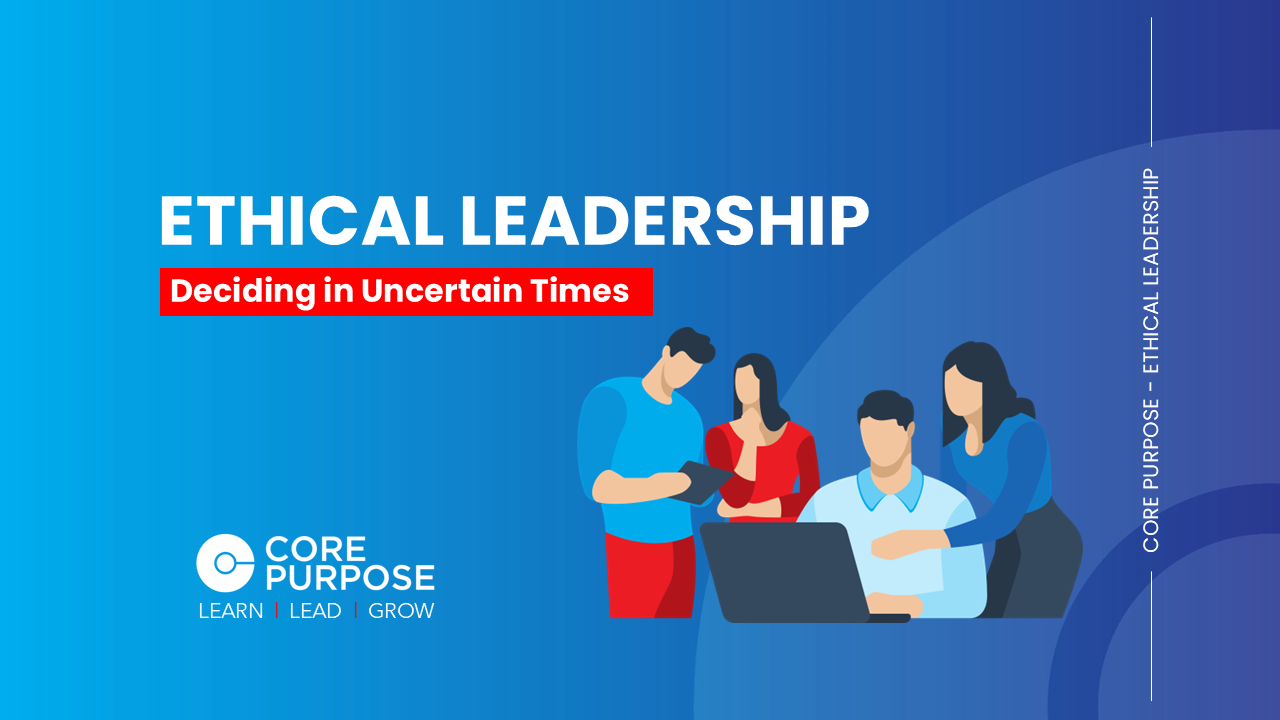
Ethical leadership is the disciplined practice of making decisions anchored in non-negotiable values, especially when the outcome is uncertain or uncomfortable. It requires self-awareness, emotional courage, and a commitment to transparency—even when doing so is unpopular or risky. Ethical leaders align intention with action and choose what is right—not what is easy, popular, or profitable.
Ethical Foundations
This view of ethical leadership is grounded in deontological ethics—doing what is right because it is right. Not because it leads to a favourable outcome. It is also shaped by virtue ethics, recognising that courage, integrity, and self-awareness are character disciplines, not tactics.
Why This Matters Now
Leadership is tested not when things are clear, but when they are not. The world is in flux—conflict, distrust, polarisation, and pressure are constant. In such times, leadership is not about certainty. It's about courage.
And we watch more closely, don’t we? We remember not just what the leaders decided—but how they decided. Were they rushed? Reactive? Or values-led?
Core Principles Related to This Topic
- Courage is an ethical stance. It's not about confidence—it's about commitment to something greater than personal comfort.
- Clarity of values precedes clarity of action. Ethical leaders get clear on what matters before deciding what to do.
- Integrity shows up in the grey areas. It's easy to be ethical when there’s no risk. But it matters most when there's pressure.
Ethical Clarity – Definition
Ethical clarity is the ability to discern what matters most in complexity. It's your internal compass when there’s no external roadmap.
What Happens Without Ethical Clarity
When leaders lack ethical clarity, something dangerous happens:
- They stop seeing the organisation as a shared space—with mutual purpose, mutual values, mutual responsibility.
- Instead, they start seeing it as their personal stage. A place to perform.
- Decisions become scripted. Feedback becomes threat. Dissent becomes betrayal.
- It’s no longer about what’s right for the team, the mission, or the long term.
- It’s about maintaining control, image, and dominance.
- Even chaos becomes useful—so long as they remain at the centre of it.
This isn’t leadership. It’s performance control disguised as vision.
And in times of uncertainty, theatre leadership is dangerous. Because when everything is fragile, people don’t need a show.
They need a compass.
Traditional Leadership vs. Ethical Leadership
Traditional waits for certainty. Ethical leads with values.
Traditional protects image. Ethical prioritises truth.
Traditional avoids conflict. Ethical engages transparently.
Traditional controls outcomes. Ethical clarifies intention.
What to do when you don’t know
You don’t reach for control.
You don’t pretend to have answers.
You reach for clarity of values.
Ethical Leadership in Action
A senior leader I worked with was navigating deep uncertainty. Decisions were stalled. Pressure rising. The team was anxious. Her message to them?
“Here’s what I know, here’s what I don’t, and here’s what I’m committed to—making decisions that reflect our values, even when the answers aren’t yet clear.”
That one sentence grounded the room. It didn’t fix the uncertainty. But it showed the path through it—with integrity.
The Impact of Ethical Leadership
When leaders model clarity, courage, and integrity in difficult times:
- Teams become more cohesive and resilient
- Decisions become aligned with long-term purpose
- Organisations become trusted—internally and externally
And leaders themselves sleep better. They know they chose what was right, not what was easy.
How to Build Ethical Leadership Capacity
- Begin each day with one reflection: What is my intention—and what principle will I stand by, even if it costs me?
- Name discomfort. Let values lead, not fear.
- Keep a decision journal. Track what guides you—and what doesn’t.
Ethical leadership is a discipline. One we urgently need.
Join The Ethical Leadership Blueprint and master ethical leadership in practice.
Culture Needs a Reset Too
Ethical leadership doesn’t exist in a vacuum. In times of uncertainty, even the most principled leaders will falter if the organisational culture is vague or inconsistent.
That’s why a clearly defined Core Ideology—your organisation’s purpose, mission, vision, and values—is essential. It provides the shared compass that helps everyone move forward when the map is missing.
In moments of ambiguity, culture either guides decisions or creates noise.
When your Core Ideology is clear:
- Leaders can act decisively, with alignment
- Teams know what matters, even when strategies change
- Communication becomes easier—anchored in shared principles
- Values become a stabilising force, not just wall posters
But when it’s missing or murky:
- People freeze or guess
- Confusion spreads
- Decisions become fragmented or fear-based
In volatile times, culture is not a side project. It’s a leadership tool. A foundation for coherence, courage, and direction.
If you haven’t reviewed your Core Ideology lately—now is the time.
Ready to reset your culture?
If you're leading in uncertain times and your team lacks a shared compass, it's time to revisit your Core Ideology.
You can explore the full approach here or reach out directly—I’d be glad to walk you through it.
Best,
Camelia Petrus
Founder, Core Purpose Ltd. | Ethical Leadership & Culture Consultant
📩 camelia.petrus@corepurpose.co.nz
We guide individuals and organisations to draw on the humanities, on the social sciences, and on the moral fabric of their leaders and employees to build moral capacity and thus reduce vulnerability.
Stay in the loop!
Join our mailing list to receive the latest news and updates from our team.
We hate SPAM too. You can unsubscribe from our list for any reason.

